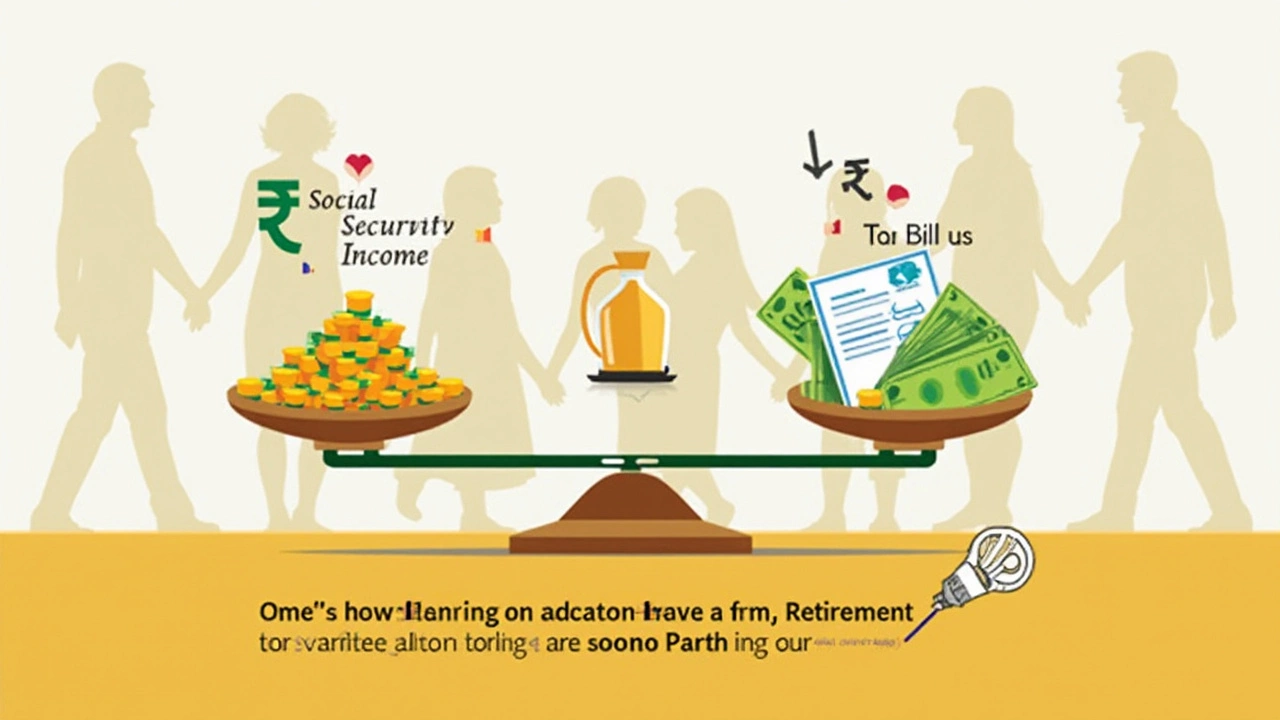If you’re hoping for a magic birthday when Social Security income stops getting taxed, you might be surprised. There’s no secret age when the IRS says, “Alright, you’re off the hook.” Whether your Social Security gets taxed depends way less on your age and way more on how much income you bring in from all sources.
Some folks hit full retirement age—right now that’s 67 for most people—and expect their Social Security checks to be tax-free, but that’s not how it works. The IRS looks at your total income, which includes Social Security, plus any wages, pensions, withdrawals from retirement accounts, or even just interest from a savings account.
If your “combined income”—that’s Social Security plus other income—crosses a certain line ($25,000 for single filers, $32,000 for married joint filers), a chunk of your Social Security income gets taxed. And this rule sticks with you no matter how many candles are on your birthday cake. It’s not about turning 70, 75, or even 90. It’s all about your tax return and what you report.
- The Real Social Security Tax Rules
- Does Your Age Really Matter?
- How Income Affects Social Security Taxes
- States with No Social Security Tax
- Tips for Paying Less Tax on Benefits
The Real Social Security Tax Rules
Alright, let’s get straight to the facts. The IRS doesn’t let everyone skate by without taxing Social Security. In reality, Social Security benefits can get taxed if your income goes over a certain limit. These limits have been set in stone for years—no automatic adjustments for inflation or cost of living, so more retirees get caught each year.
Here’s how they figure it out: First, you calculate your "combined income." That’s your adjusted gross income (like wages, pensions, IRA withdrawals), plus nontaxable interest, plus half of your Social Security benefits. The IRS uses this number to check if part of your benefits are on the hook for taxes.
- If you’re single and your combined income is below $25,000, your Social Security is totally tax-free.
- Between $25,000 and $34,000, up to 50% of your benefits could get taxed.
- Over $34,000, as much as 85% of your Social Security can be taxable income.
For folks who file jointly, the limits are a little better:
- Below $32,000, no taxes on your benefits.
- $32,000 up to $44,000, up to 50% taxed.
- Over $44,000, up to 85% taxed.
Here’s a quick cheat sheet for these numbers:
| Filing Status | Combined Income Ranges | % of Social Security Taxable |
|---|---|---|
| Single | Under $25,000 | 0% |
| Single | $25,000 - $34,000 | Up to 50% |
| Single | Above $34,000 | Up to 85% |
| Married Joint | Under $32,000 | 0% |
| Married Joint | $32,000 - $44,000 | Up to 50% |
| Married Joint | Above $44,000 | Up to 85% |
One important thing—not everyone pays tax on the entire benefit, even in the highest tax bracket. Only up to 85% is countable, not the whole amount. And just to clear it up, these are federal rules. Some states also tax Social Security, while others don’t touch it at all. We’ll cover that later.
So, to sum it up: there’s no magic age when your Social Security benefits just become tax free. The Social Security tax depends mainly on how much total income you have while filing your tax return.
Does Your Age Really Matter?
This is where a lot of people get tripped up. For Social Security, your age fully matters when you’re signing up for benefits (like early, regular, or delayed retirement). But when we’re talking about taxes, age pretty much takes a back seat. The IRS doesn’t just stop taxing Social Security income once you hit a certain number. It all circles back to how much income you have in a year, not how many birthdays you’ve celebrated.
Some key ages do pop up in retirement talk. For example, you can claim Social Security as early as 62, get full benefits at full retirement age (which ranges from 66 to 67, based on your birth year), and at age 70 you max out your benefit if you delayed. But Social Security income itself doesn’t suddenly turn tax-free at any milestone birthday. It could be taxed at 62, 72, or 92 if your income is high enough.
Here’s how the main retirement ages stack up for Social Security, just so you can see where they fit in:
| Milestone Age | What Happens |
|---|---|
| 62 | Earliest age to claim Social Security (reduced benefit) |
| 66-67 | Full retirement age (varies by birth year) |
| 70 | Maximum benefit if you delayed |
So, your tax bill isn’t tied to these ages at all. It’s driven by your yearly income and how you file your taxes. Whether you’re a young retiree or a super senior, the rules are the same. Bottom line: Don’t expect the taxman to ignore your Social Security income because you’ve passed a certain birthday—he simply doesn’t care about the number as much as your bank statements each year.

How Income Affects Social Security Taxes
Social Security checks aren’t always tax-free, even if you’ve been paying into the system for decades. The IRS cares about your full financial picture—not just your age or how long you’ve been retired. Here’s how it works: your benefits may be taxable if your combined income goes over certain limits.
Combined income isn’t fancy math. Just add up your adjusted gross income, any tax-free interest (like from some municipal bonds), and half your Social Security benefits. The sum decides if—and how much—of your Social Security gets taxed.
| Filing Status | Combined Income | % of Benefits Taxed |
|---|---|---|
| Single | $25,000 - $34,000 | Up to 50% |
| Single | Over $34,000 | Up to 85% |
| Married Filing Jointly | $32,000 - $44,000 | Up to 50% |
| Married Filing Jointly | Over $44,000 | Up to 85% |
So, let’s say you’re single with a combined income of $33,000. Up to 50% of your Social Security can be taxed by the IRS. If that combined income jumps above $34,000, the IRS can tax up to 85% of those benefits. It’s almost never the whole check, but it can be a big bite.
- Pensions, part-time work, traditional IRA withdrawals, and even rental income all add up—anything that boosts your reportable income.
- Hitting 70 or any milestone birthday doesn’t wipe out this rule; the IRS keeps watching your income totals every year.
The only way to fully dodge Social Security taxes is to keep your total income below those listed levels. If that’s not doable, tax planning—like tapping Roth IRAs (which don’t count toward combined income) or spreading out income—can make a real difference. And remember, every year brings a new tax return, so your Social Security tax situation can change depending on what you earn or withdraw.
This is why understanding Social Security tax rules can help you keep more of your retirement money. A little planning goes a long way.
States with No Social Security Tax
Most people don’t realize state taxes can hit your Social Security income too, not just the federal government. The good news? In more than half the country, Social Security benefits aren’t taxed at the state level—no matter how much you collect or how old you are.
Here’s a look at the states where you can keep your Social Security checks completely state-tax free:
- Alabama
- Alaska
- Arizona
- Arkansas
- California
- Delaware
- Florida
- Georgia
- Hawaii
- Idaho
- Illinois
- Indiana
- Iowa
- Kentucky
- Louisiana
- Maine
- Maryland
- Massachusetts
- Michigan
- Mississippi
- Nevada
- New Hampshire
- New Jersey
- New York
- North Carolina
- Ohio
- Oklahoma
- Oregon
- Pennsylvania
- South Carolina
- Tennessee
- Texas
- Virginia
- Washington
- Wisconsin
- Wyoming
Just for a quick look, here are the numbers: 38 states (plus Washington, D.C.) do not tax Social Security benefits. That means if you live in one of those places, state income tax won’t eat into your retirement income. Here’s a simple table showing how it shakes out:
| State | State Taxed? |
|---|---|
| Texas | No |
| Florida | No |
| California | No |
| Minnesota | Yes |
| Vermont | Yes |
| Connecticut | Yes (with income limits) |
| Colorado | Yes (partial exemption) |
Most states that do tax Social Security—like West Virginia, Colorado, Vermont, and Connecticut—either have income cutoffs or special rules. So, if keeping more of your benefits matters to you, it’s worth checking your own state’s rules or even considering a move down the road.
Tip: State tax laws change pretty often. If you’re planning a move or filing taxes soon, always double-check the latest info on your state’s Department of Revenue site. Don’t leave money on the table just because you missed a rule update.

Tips for Paying Less Tax on Benefits
Paying taxes on Social Security benefits doesn’t have to be a headache. If you know how the rules work, you can use them to your advantage. The trick is to lower your combined income or at least keep it below the IRS limits so you can shrink or dodge taxes on your Social Security.
- Delay Drawing on 401(k)s or IRAs: If you hold off on pulling money from retirement accounts until you actually need it, you can keep your income lower for longer. The less you take out, the less gets counted against your Social Security.
- Watch Your Other Income: Working part-time, getting rental income, or earning investment interest? All of it bumps up your total income and might push your benefits into the taxable zone. Time your side jobs or consult a tax pro to balance things out.
- Consider Roth Accounts: Withdrawals from Roth IRAs don’t count as income for Social Security tax calculations. Moving some nest egg money to a Roth before you retire can help lower your taxable income when you do retire.
- Take Advantage of Tax-Free Bonds: Interest from municipal bonds doesn’t get taxed by the feds and isn’t counted in the Social Security formula. It’s a solid way to get extra cash without waking up the IRS.
- Handle Required Minimum Distributions (RMDs) Smartly: Once you hit 73, the government makes you take RMDs from most retirement accounts. If you’re not careful, these can push your income way up. Plan ahead, maybe by converting some accounts to a Roth before you hit RMD age.
Here’s a quick breakdown of how much Social Security gets taxed at different income levels:
| Filing Status | Combined Income | Percent of Benefits Taxable |
|---|---|---|
| Single | Up to $25,000 | 0% |
| Single | $25,000 - $34,000 | Up to 50% |
| Single | Over $34,000 | Up to 85% |
| Married Filing Jointly | Up to $32,000 | 0% |
| Married Filing Jointly | $32,000 - $44,000 | Up to 50% |
| Married Filing Jointly | Over $44,000 | Up to 85% |
If you want to keep more of your Social Security income, the best move is to watch your numbers carefully every year before tax season. Even small shifts can make a big difference come April.
